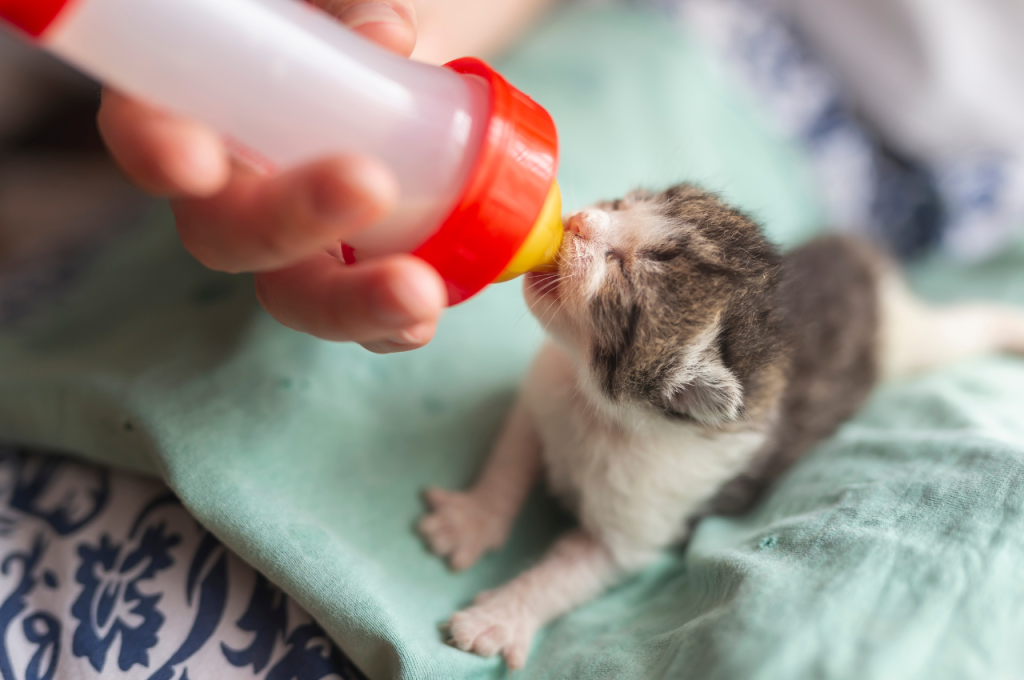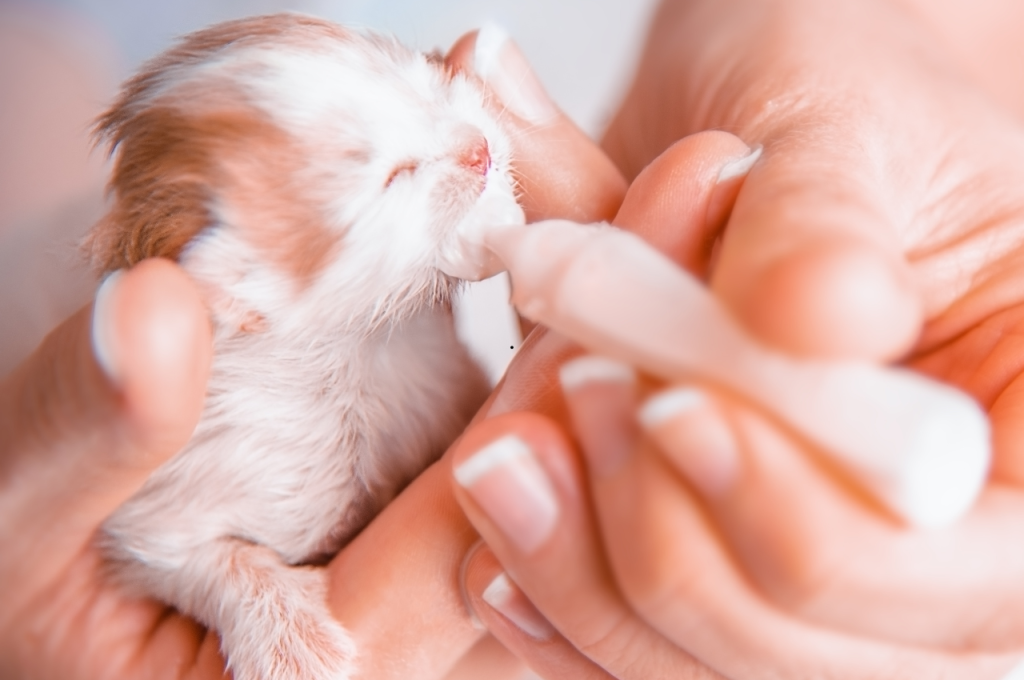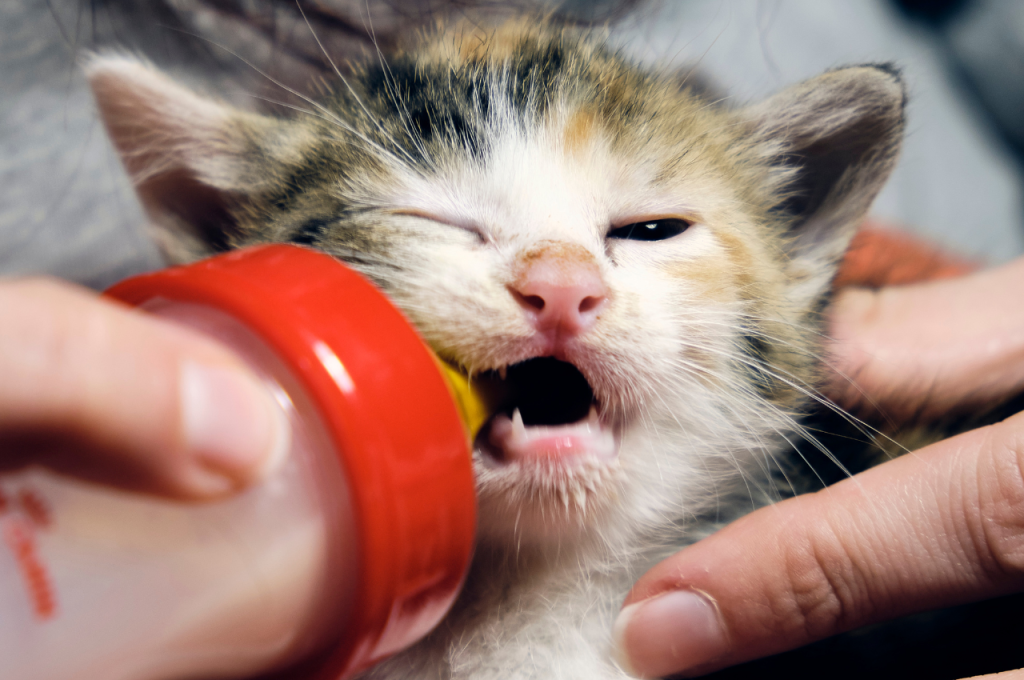To feed a newborn kitten, use a commercial milk replacer and a feeding bottle with kitten nipples. Make sure to feed the kitten every 2-3 hours and keep them warm and comfortable.
Additionally, you can introduce wet kitten food mixed with milk replacer when they are around 4 weeks old. Welcoming a new kitten into your home can be an exciting and rewarding experience. However, caring for a newborn kitten requires special attention and proper nutrition to ensure their healthy growth and development. We will provide essential tips and guidelines on what to feed a newborn kitten, so you can confidently nurture your new feline companion.
Introduction to Newborn Kitten Care
Kittens require proper nourishment for healthy growth and development. Ensuring adequate nutrition is vital for their overall well-being and immunity. Kittens go through critical growth phases that require specific care. Being aware of these development stages helps in providing appropriate care.

Identifying a Newborn Kitten’s Dietary Needs
Newborn kittens require a specially formulated kitten milk replacer, not regular cow’s milk. Feed them using a small bottle or syringe every 2-3 hours to ensure proper nutrition and growth.
Caloric Requirements
Newborn kittens require adequate caloric intake to support their rapid growth and development. As a general guideline, a neonatal kitten needs approximately 8-10 calories per ounce of body weight per day to thrive. It’s important to ensure that the kitten formula being fed provides the necessary caloric content to meet these requirements.
Essential Nutrients for Growth
Vital nutrients play a crucial role in the healthy growth of a newborn kitten. Proteins, which are made up of essential amino acids, aid in muscle development and overall body function. Fats are a concentrated source of energy and are essential for healthy skin and coat. Additionally, carbohydrates provide a source of readily available energy. These nutrients must be present in the kitten formula to ensure the kitten’s nutritional needs are met.
The Role of Mother’s Milk
A newborn kitten should be fed mother’s milk or kitten milk replacer every two to three hours. It is crucial for their growth and development, providing essential nutrients and antibodies. Avoid feeding cow’s milk as it can cause digestive issues.
Benefits of Colostrum
Mother’s milk plays a crucial role in the development and nourishment of newborn kittens. The initial milk produced by the mother, known as colostrum, is especially important. Colostrum is a thick, yellowish fluid that is packed with essential nutrients and antibodies. It is usually produced by the mother in the first few days after giving birth. The benefits of colostrum are numerous. Here are some key points to consider:
- Nutritional Powerhouse: Colostrum is rich in proteins, fats, vitamins, and minerals, providing the necessary nutrition for fragile newborn kittens.
- Immune System Boost: Colostrum contains high levels of antibodies that help protect the kittens from infections and diseases. These antibodies are essential for building a strong immune system.
- Gut Health: Colostrum also contains substances that help promote the growth of beneficial bacteria in the kittens’ digestive system. This contributes to the overall health of their gut.
- Stimulates Bowel Movements: The components in colostrum help stimulate the kittens’ digestive system, aiding in the passage of their first bowel movements. This is crucial for eliminating waste and preventing constipation.
- Passive Immunity Transfer: The antibodies present in colostrum are absorbed directly into the bloodstream of the kittens, providing them with passive immunity. This temporary protection helps safeguard them until their own immune system fully develops.
In summary, colostrum is a vital substance that provides essential nutrition and immunity to newborn kittens, setting them on the right path for a healthy start in life.
What If The Mother is Unavailable?
In some cases, the mother may be unable or unwilling to nurse her kittens. This can happen due to various reasons, such as the mother’s illness, death, or rejection of the litter. If the mother is unavailable, it is crucial to provide the newborn kittens with an alternative source of nutrition and care. Here are the steps to take when the mother is not available:
- Consult a Veterinarian: If the mother is absent, it is essential to seek guidance from a veterinarian as soon as possible. They can provide expert advice on feeding and caring for the kittens.
- Choose a Suitable Milk Replacer: A milk replacer specifically formulated for kittens should be used as a substitute for mother’s milk. These replacers are available at pet stores or can be obtained from a veterinarian.
- Feeding Schedule: Newborn kittens require frequent feedings, typically every 2-3 hours. Follow the instructions provided with the milk replacer for the appropriate feeding amounts and frequency.
- Bottle-Feeding: Use a small, clean, and sterilized bottle with a nipple specifically designed for kittens. Make sure to warm the milk replacer to the appropriate temperature before feeding.
- Stimulate Elimination: After each feeding, gently stimulate the kittens’ genital area using a warm, damp cloth or cotton ball. This mimics the mother’s grooming behavior and encourages urination and defecation.
Remember, hand-rearing newborn kittens requires time, patience, and careful attention to detail. Ensuring the kittens receive proper nutrition and care is essential for their growth and well-being.
Bottle Feeding Basics
Newborn kittens require special care when it comes to bottle feeding. Providing them with a formula specifically designed for kittens is essential for their growth and development. Make sure to follow the guidelines for feeding frequency and proper sterilization of bottles to ensure their health and well-being.

Choosing The Right Kitten Formula
When it comes to bottle-feeding a newborn kitten, choosing the right formula is crucial for their health and growth. Kittens require a specific type of milk replacement formula that closely resembles the nutrients found in their mother’s milk. This formula provides essential nutrients, such as proteins, fats, carbohydrates, vitamins, and minerals, necessary for their development.
It’s important to note that cow’s milk or other types of milk intended for human consumption are not suitable for kittens. These options lack the necessary nutrients and can cause digestive issues and malnutrition in kittens. The best option for feeding a newborn kitten is a commercial kitten milk replacement formula, readily available at most pet stores or veterinary clinics. These formulas are specifically designed to meet the nutritional needs of growing kittens. When selecting a formula, look for one that is specifically labeled for kittens and follow the instructions on the packaging for proper preparation.
Feeding Techniques and Schedules
Feeding a newborn kitten requires patience and attention to detail. Here are some feeding techniques and schedules to ensure the proper nourishment of your furry friend:
- Bottle Preparation: Before each feeding, make sure to clean the bottle and nipple thoroughly. Sterilize them by boiling for a few minutes or using a bottle sterilizer. This step helps prevent the growth of harmful bacteria that could cause illness.
- Positioning: Hold the kitten in a slightly upright position, simulating the natural nursing position. This helps prevent choking and ensures proper milk flow.
- Feeding Amount: The amount of formula to feed depends on the kitten’s age and weight. As a general guideline, feed approximately 8-12 milliliters of formula per ounce of body weight per day. Divide this amount into multiple feedings throughout the day to mimic the frequency of nursing from their mother.
- Feeding Schedule: Newborn kittens need to be fed every 2-3 hours, including during the night. As they grow, the frequency of feedings can gradually decrease. Follow a consistent feeding schedule to establish a routine that helps the kitten feel secure and promotes healthy development.
- Burping: After each feeding, gently hold the kitten against your shoulder and pat their back to help them burp. This helps release any trapped air and prevents discomfort.
- Weight Monitoring: Regularly monitor the kitten’s weight to ensure they are growing at a healthy rate. Consult with a veterinarian if there are any concerns about their weight gain or overall development.
Remember, each kitten is unique, and their nutritional needs may vary. It is always best to consult with a veterinarian for personalized advice and guidance on feeding techniques and schedules based on your kitten’s specific requirements. By following these bottle-feeding basics, you can provide the essential nourishment and care needed for a healthy and thriving newborn kitten.
Transitioning to Solid Food
Transitioning to solid food is an important step for newborn kittens. Knowing what to feed them is crucial for their growth and development. Providing a balanced diet with kitten-specific food is essential to ensure they receive all the necessary nutrients.
When to Introduce Solids
Newborn kittens can start transitioning to solid food at around four weeks old.
Selecting High-quality Kitten Food
Choose a kitten-specific wet food that is high in protein and free from artificial additives.
Feeding Orphaned Kittens
To nourish a newborn kitten, it’s crucial to feed them a milk replacer specially formulated for kittens. The milk should be warmed to body temperature and fed through a bottle or syringe every 2-3 hours. As the kitten grows, a gradual transition to solid food can begin around 3-4 weeks of age.
When it comes to feeding orphaned kittens, it is essential to understand their nutritional needs and provide them with a supportive environment to thrive. Special considerations must be taken into account when feeding newborn kittens, as they require a specific diet to ensure healthy growth and development. Creating a supportive environment is also crucial to their well-being. In this article, we will discuss the special considerations and ways to create a supportive environment for orphaned kittens.
Special Considerations
Orphaned kittens require special attention when it comes to feeding. Unlike adult cats, kittens have small stomachs and require frequent feedings. Kittens under four weeks of age should be fed every two to three hours, while those between four and six weeks can be fed every four hours. It is also crucial to use a kitten-specific formula that provides the necessary nutrients. When feeding newborn kittens, it is essential to ensure that they are receiving enough milk.
Kittens can quickly become dehydrated, so it is important to monitor their hydration levels and provide them with water. Kittens should also be weighed daily to ensure they are gaining weight and growing at a healthy rate.
Creating A Supportive Environment
Creating a supportive environment for orphaned kittens is crucial to their well-being. Kittens need a warm and comfortable space to rest and sleep, away from drafts and noise. A heating pad set on low can provide warmth, but it is essential to ensure that it is not too hot and that the kittens can move away from it if needed. Kittens also require stimulation to develop properly. Providing toys and opportunities for play can help them develop their physical and cognitive abilities. Socialization is also crucial, as kittens need to learn how to interact with people and other animals.
In conclusion, feeding orphaned kittens requires special considerations and a supportive environment to ensure their healthy growth and development. By providing them with proper nutrition, hydration, and a warm and stimulating environment, you can help them thrive and grow into healthy adult cats.
Common Feeding Issues and Solutions
Feeding a newborn kitten comes with its own set of challenges. It’s not uncommon for caretakers to encounter various feeding issues that can hinder the kitten’s growth and development. Understanding these common feeding issues and their solutions is crucial for ensuring the well-being of the young feline.
Addressing Lack of Appetite
Newborn kittens may sometimes exhibit a lack of appetite, which can be concerning for their caregivers. This could be due to various reasons such as illness, stress, or environmental changes. To address this issue:
- Ensure a warm and quiet environment to minimize stress and discomfort.
- Offer small, frequent feedings to entice the kitten to eat.
- Use a kitten milk replacer if the mother’s milk is not available or insufficient.
Dealing with Digestive Problems
Digestive issues can also pose a challenge when feeding newborn kittens, leading to concerns such as diarrhea or constipation. To mitigate these problems:
- Gradually transition to solid food as the kitten grows and develops.
- Consult a veterinarian for specialized formulas or medication if digestive issues persist.
- Monitor the kitten’s hydration and ensure access to clean water at all times.
Monitoring Kitten Growth and Health
Knowing what to feed a newborn kitten is crucial for its growth and health. Provide kitten formula every few hours and monitor weight gain. Regular vet check-ups ensure proper development and help identify any health issues early.

Regular Weigh-ins
Regular weigh-ins are crucial for monitoring the growth and development of newborn kittens. Weigh the kitten daily using a digital kitchen scale, preferably at the same time each day. Keep a record of the weight to ensure consistent growth and to identify any potential issues early on.
Recognizing Signs of Nutritional Deficiencies
It’s important to be aware of the signs of nutritional deficiencies in newborn kittens. Look for symptoms such as stunted growth, weakness, lethargy, and changes in fur quality. Consult a veterinarian if you notice any of these signs to address the issue promptly.
Conclusion
Feeding a newborn kitten may seem daunting, but with the right knowledge and preparation, it can be a rewarding experience. From the moment they are born, kittens require specific nutrients to thrive and grow. By providing them with a diet that is high in protein and fat, and consulting with a veterinarian if necessary, you can ensure that your furry friend stays healthy and happy.
Remember, every kitten is different, so it’s important to monitor their weight and adjust their diet accordingly. With love and care, you can raise a happy and healthy kitten.
